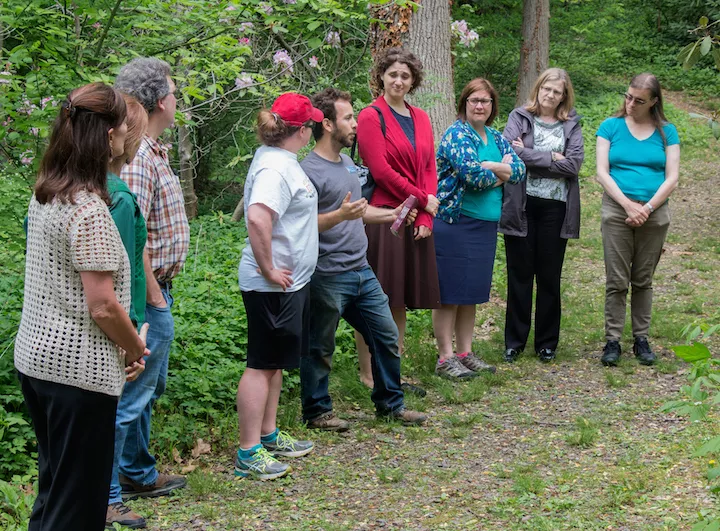Faculty-Staff Book Club Explores Climate Change and Justice

The lessons leaped off of the page with the mushroom walk, for which Crum Woods Restoration Assistant Mike Rolli (center) guided participants from the Amphitheater to the Crum Woods.
The issues surrounding climate change — in particular, the prospect of mass extinction — can be difficult to wrap one’s head around, says Pam Harris, associate college librarian for research and instruction.
“Our brains are hardwired to, what? Denial? Hope?”
So, reading about it can be daunting. But Swarthmore’s faculty-staff book club embraced that challenge this spring, exploring stories on the environment with an emphasis on climate change and justice.
Reflecting the College’s commitment to environmental sustainability, the club had co-facilitators who grapple with issues of climate change through their work on campus. Among them were Aurora Winslade, director of sustainability; Giovanna Di Chiro, professor of environmental studies; Mark Wallace, professor of religion and environmental studies committee member; and Betsy Bolton, professor of English literature, director of environmental studies, and co-chair of the Crum Woods Stewardship Committee.
The facilitators picked three books for each of the four groups to read at meet-ups throughout the semester. They also chose a fourth, The Mushroom at the End of the World, for all participants to discuss together at an early-May potluck and a mushroom walk in the Crum Woods.
“As always, I love the conversation around one topic with people from different parts of campus,” says Carina Yervasi, associate professor of French, who co-facilitated a group with Jen Moore, administrative assistant for the Department of History.
“If I had one big takeaway," Yervasi adds, "it would be that I discovered how much people engage with questions about climate change in very different ways, but want to reach similar objectives of both understanding of and practical solutions for environmental preservation.”
Among the highlights for Harris’ group were a collection of African-American poems on nature, a dystopian tale about the drying up of the Colorado River, and Wen Stephenson’s What We Are Fighting for Now Is Each Other.
The latter conveyed the courage of climate activists through history, she says, “including the tale of the Golden Rule, the ship that sailed in 1958 with a small crew of anti-nuclear weapons activists, and whose ship’s log and other items we have in the libraries!”
The book talk also veered into brainstorming sessions on how the members of the groups could make a difference on climate change in their own communities. For some participants, including co-facilitator Tania Johnson, it was the most they had ever “mentally wrestled” with these issues.
“This experience really opened my eyes and provided a grounding in what we’re all up against,” says Johnson, director of sponsored programs. “I realized that I’ll need to make time and space in my life to create a more sustainable lifestyle.”
The lessons leaped off of the page with the mushroom walk, for which Mike Rolli, Crum Woods restoration assistant, led book club members from the Amphitheater into the woods. They gazed at less-known native plants, delighted in the beauty and solace of the woods, and even tasted a mushroom found growing on a tree.
“It didn’t taste very good,” says Yervasi, “but it was still thrilling to eat something right from the Crum Woods.
“It enhanced my appreciation for the mushroom pickers [Anna Lowenhaupt Tsing] talked about in the book,” she adds, “and the ways that a simple mushroom can be indicative of so much of the life-cycle of a forest.”
This is the fourth chapter of the book club, which is sponsored by the College's Aydelotte Foundation for the Advancement of the Liberal Arts. Professor of History Allison Dorsey proposed the club in 2014, in anticipation of a visit by Toni Morrison, and in subsequent years the club plumbed the themes of food and work.
It reflects the Aydelotte Foundation’s commitment to being a catalyst for intellectual exploration and engagement, inside and outside of the classroom, says Pam Shropshire, senior associate director for program development.
“It’s a fun and engaging way for the Foundation to bring faculty and staff together for a common intellectual exercise,” she says. “The members of the group may change from year to year, but the thing that doesn’t change is a celebration of reading and desire to engage with members across the Swarthmore community.”



